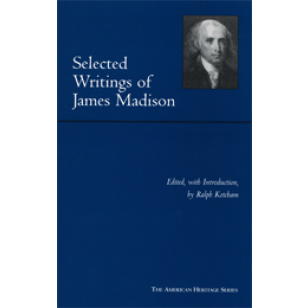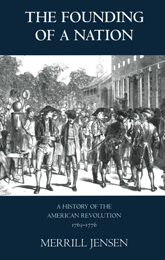Selected Writings of James Madison
"This valuable anthology of the framer's essential writings allows readers to experience the panoramic depth of Madison's mind. For those just beginning their study, Ketcham's choices offer a meaningful introduction to Madison's complex view of the whole. . . . Of special note is the final section, in which Ketcham provides a selection of Madison's treatises on issues that cut the Union asunder in the decade prior to the Civil War. In this reviewer's mind, the editor is to be praised for his efforts in assembling such a comprehensive, cohesive, and concise collection. Summing Up: Essential."
—M. J. C, Taylor, CHOICE
eBook available for $14.95. Click HERE for more information.
Selected as a CHOICE Outstanding Title
The writings collected here reflect the Madison who emerges from the best scholarship of the last thirty years—scholarship to which Ralph Ketcham, as editor of The Papers of James Madison and in many other ways, has made stunning contributions. Ketcham's Introduction, a brief chronology, the text of the Constitution, and an index further distinguish this collection.
Reviews:
"This valuable anthology of the framer's essential writings allows readers to experience the panoramic depth of Madison's mind. For those just beginning their study, Ketcham's choices offer a meaningful introduction to Madison's complex view of the whole. . . . Of special note is the final section, in which Ketcham provides a selection of Madison's treatises on issues that cut the Union asunder in the decade prior to the Civil War. In this reviewer's mind, the editor is to be praised for his efforts in assembling such a comprehensive, cohesive, and concise collection. Summing Up: Essential."
—M. J. C, Taylor, CHOICE
"[Ketcham's] writing is crisp; his tone inviting. His Introduction consistently and persistently locates Madison's reasoning within its political context . . . Above all else, it had on me the proper effect: it made me want to read Madison himself."
—Paul Rahe, University of Tulsa
"The introductory essay is well-written: tight, succinct, and clear. Ketcham does a fine job explaining and contextualizing difficult theoretical concepts in a way that students will find accessible."
—Howard Lubert, James Madison University
"I don't think anyone could debate the value of this book. To understand American government, you must know what Madison thought. The level of Madison [presented here] is just right for even an introductory level course. This is a great book."
—James W. Stoutenborough, Department of Political Sciene, University of Kansas
"Noted Madison scholar Ralph Ketcham has put together a very valuable one-volume edition of the writings of Madison. The selections are well chosen, giving the reader a good taste of Madison's thought. The Introduction would be worth the price of the volume itself—this is the most useful one-volume paperback edition of Madison's writings."
—John P. Irish, AP U.S. History, Seven Lakes High School
Contents:
Abbreviations in Headnote Citations.
Introduction.
Revolution, 1773–1785:
1. Freedom of Religion; To William Bradford, December 1, 1773, January 24, 1774, and
April 1, 1774.
2. Essay on Money; Written September 1779–March 1780.
3. Foreign Affairs; Instructions to John Jay, October 17, 1780.
4. Address to the States by Congress on Finances; April 26, 1783.
5. A Memorial and Remonstrance against Religious Assessments; June 20, 1785.
6. The Law of Nature and Majority Rule; to Marquis de Lafayette, March 20, 1785;
and to James Monroe, October 5, 1786.
7. Constitutional Principles; to Caleb Wallace, August 23, 1785.
The Federal Constitution, 1786–1789:
8. Vices of the Political System of the United States; April 1787.
9. Proposed Principles for Federal Convention; to George Washington, April 16, 1787.
10. Notes on the Proceedings: The Virginia Plan; Federal Convention, May 29, 1787.
11. Election of Representatives; Federal Convention Speech, June 6, 1787.
12. Reply to New Jersey Plan; Federal Convention Speech, June 19, 1787.
13. The Federal System; Federal Convention Speech, June 21, 1787.
14 Term of Office for Senators; Federal Convention Speech, June 26, 1787.
15. State Equality in the Senate; Federal Convention Speeches, June 28–30, 1787.
16. The Imperative of Majority Rule; Federal Convention Speeches, July 5 and 14, 1787.
17. Separation of Powers and Electing the Executive; Federal Convention Speeches,
July 17, 19, 21, and 25, 1787.
18. The Right of Suffrage; Federal Convention Speech, August 7, 1787.
19. Citizenship for Immigrants; Federal Convention Speech, August 9, 1787.
20. State and Federal Power and the Public Good; to Thomas Jefferson, October 24, 1787.
21. The Union as a Safeguard against Faction; Federalist No. 10, November 22, 1787.
22. The Future of a Large and Prospering Union; Federalist No. 14, November 30, 1787.
23. Stability, Energy, and Liberty in the Federal Union; Federalist No. 37, January 11, 1788.
24. Combining National and Federal Forms; Federalist No. 39, January 16, 1788.
25. The Important and Continuing Power of the States; Federalist No. 45, January 26, 1788.
26. Montesquieu's Principle of Separation of Powers; Federalist No. 47, January 30, 1788.
27. Checks and Balances within the Separation of Powers; Federalist No. 48, February 1, 1788.
28. Reason, not Passion, Necessary for Good Government; Federalist No. 49, February 2, 1788.
29. Explanation of Checks and Balances Concluded; Federalist No. 51, February 6, 1788.
30. Human Nature and the Size of Deliberative Assemblies; Federalist No. 55, February 13, 1788.
31. Human Nature and Good Government in the House of Representatives; Federalist No. 57,
February 19, 1788.
32. The Senate as a Deliberative Body; Federalist No. 62, February 27, 1788.
33. Further Justification of the Senate, Especially the Length of the Term in Office;
Federalist No. 63, March 1, 1788.
34. Defense of the Constitution; Virginia Convention Speech, June 6, 1788.
35. Taxation, Religious Liberty, and the Mississippi; Virginia Convention Speech, June 12, 1788.
36. Judicial Power; Virginia Convention Speech, June 20, 1788.
37. For and against Bill of Rights Amendments to the Constitution; to Thomas Jefferson,
October 17, 1788.
38. Titles for Addressing the President; Speech in Congress, May 11, 1789.
39. Adding a Bill of Rights to the Constitution; Speech in Congress, June 8, 1789.
Legislation and Politics, 1789–1800:
40. Presidential Removal Power; Speeches in Congress, June 16–17, 1789.
41. Abolition of Slavery and Asylum for Freed Slaves; Memorandum to Abolitionists,
c. October 20, 1789.
42. Does the Earth Belong to the Living Generation?; to Thomas Jefferson, February 4, 1790.
43. Conscientious Objection to Military Service; Speech in Congress, December 22, 1790.
44. Construction of the Constitution and Opposition to a National Bank; Speech in Congress,
February 2, 1791.
45. Political Essay: Population and Emigration; November 21, 1791.
46. Political Essays: Consolidation and Public Opinion; December 5 and 19, 1791.
47. Political Essays: Government and Government in the United States; January 2, and
February 6, 1792.
48. Political Essays: Charters and Parties; January 19 and 23, 1792.
49. Political Essay: Universal Peace; February 2, 1792.
50. Political Essay: Spirit of Governments; February 20, 1792.
51. Political Essay: Republican Distribution of Citizens; March 5, 1792.
52. Political Essay: Property; March 29, 1792.
53. Political Essay: A Candid State of Parties; September 26, 1792.
54. Political Essay: Who Are the Best Keepers of the People's Liberties?; December 22, 1792.
55. The French Revolution; to George Nicholas, March 15, 1793.
56. Executive Power in Foreign Relations; Helvidius No. 1 and No. 4, August 24, and
September 14, 1793.
57. War and Republicanism; from Political Observations, April 20, 1795.
58. Resolutions against the Alien and Sedition Acts; Adopted by the General Assembly of Virginia,
December 21, 1798.
59. Foreign Influence and Political Reflections; Aurora General Advertiser, January 23, and
February 23, 1799.
60. States' Rights and Freedom of Expression; Report on the Virginia Resolutions,
January 7, 1800.
Executive Power, Foreign and Domestic, 1801–1817:
61. The Louisiana Purchase; to Robert R. Livingston and James Monroe, March 2, 1803.
62. International Trade in Wartime: Examination of the British Doctrine, January 1806.
63. The Embargo; to William Pinkney, January 3, 1809.
64. First Inaugural Address; March 4, 1809.
65. Freedom of Religion; Veto Message, February 21, 1811.
66. War Message to Congress and Peace Appeal to Indians, June 1, and August 9, 1812.
67. Dissent in Wartime; to Wilson Cary Nicholas, November 26, 1814.
68. A National Program; Seventh Annual Message to Congress, December 5, 1815.
69. Internal Improvements; Veto Message, March 3, 1817.
Religion, Education, Slavery, Reform, Courts—and Democracy and the Constitution Again, 1817–1836:
70. Foundation of Religious Belief; to Frederick Beasley, November 20, 1825.
71. Religion and Civil Society; to Robert Walsh, March 2, 1819; and to Edward Livingston,
July 10, 1822.
72. Education; to William T. Barry, August 4, 1822.
73. The University of Virginia; to Thomas Jefferson, February 8, 1825, and February 24, 1826.
74. Slavery; to Robert Evans, June 15, 1819; and to Thomas R. Dew, February 23, 1833.
75. Utopia and Social Reform; to Frances Wright, September 1, 1825; and to Nicholas P. Trist,
January 29, 1828.
76. Foreign Policy and International Trade; to James Monroe, Richard Rush, Marquis de Lafayette,
and John Quincy Adams, 1817–1824; and to Joseph C. Cabell, October 30, 1828.
77. Judicial Power and the Constitution; to Spencer Roane, September 2, 1819,
June 15 and 29, 1821.
78. Nullification and Interpreting the Constitution; to Edward Everett, August 28, 1830.
79. Suffrage and Majority Rule; Notes on Suffrage, 1821–1829; Speech, Virginia Convention,
December 2, 1829; Notes on Majority Governments, 1833.
80. Comments on Benjamin Franklin, Thomas Jefferson, John Adams, and Alexander Hamilton;
to James K. Paulding, April 1831.
81. Final Thoughts; Advice to My Country, 1834; and to George Tucker, June 27, 1836.
Appendix.
Constitution of the United States.
Amendments to the Constitution.
Bibliography.
Index.
About the Author:
Ralph Ketcham is Professor Emeritus of Political Science, History and Public Affairs, Syracuse University.







